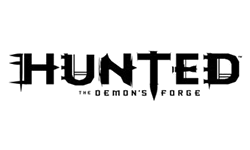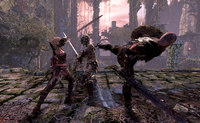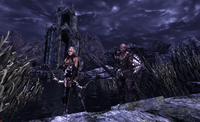|
|

|
PLATFORM
|
Xbox 360
|
BATTLE SYSTEM
|

|
INTERACTION
|

|
ORIGINALITY
|

|
STORY
|

|
MUSIC & SOUND
|

|
VISUALS
|

|
CHALLENGE
|
Moderate
|
COMPLETION TIME
|
Less than 20 Hours
|
|
OVERALL

|
+ Detailed environments.
+ Solid mix of shooting and melee combat.
+ Great multiplayer options.
- Rigid aiming and sticky cover system.
- Limited RPG elements.
|
Click here for scoring definitions
|
|
|
As the line that determines what qualifies as an RPG becomes more and more blurred, there is an interesting side effect that certainly many RPGamers have come across: a broader gaming palate. Hunted: The Demon's Forge is a game that combines genres in such a way as to potentially open people up to new experiences they might otherwise ignore, and it does that by hardly being an RPG at all. While the game is, strictly speaking, a fantasy dungeon crawler with many common RPG mechanics at play, it actually bears a richer similarity to third person shooters like Uncharted.
Developed by inXile, best known for its 2004 adaptation of The Bard's Tale, Hunted tells the story of two mercenaries in a unique high-fantasy world that's under siege by a deadly adversary. Caddoc is a cautious and somewhat superstitious warrior, and his partner E'lara is a crass elven archer with a penchant for fire and explosions. The pair encounter a strange, mystical woman named Seraphim, who sets them on a quest to find her physical form, which has been captured in the nearby city of Dyfed. The pair take on this task by tracking a caravan of slaves as they're led to a distant location, fighting their way through wolgar (similar to orcs), tribes-people, minotaurs, and demons.
Although the game's plot doesn't get particularly complex, the relationship and banter between Caddoc and E'lara, as well as the potentially devastating multiple endings, are more than enough reason to pay attention. The dialogue ranges from solid to hilarious, bolstered by solid, if occasionally overacted, voicework from actors that include Xena: Warrior Princess veteran Lucy Lawless. More than anything, the characters feel believable, despite the fanciful and incredulous world they inhabit. It's clear that there's a long-standing relationship between them that extends far beyond the confines of the game's timeline, and this really helps keep the story interesting.
 Environments are terrifically detailed.
Environments are terrifically detailed.
|
|
Hunted's mechanics are what make the game stand out as particularly intriguing, as it includes a blend of shooter, action, and RPG features that create a unique experience, despite some hiccups in its execution. The dungeon design resembles a typical linear shooter, with occasional open combat areas and side-paths that lead to hidden secrets and puzzles. Despite its constricted nature, levels are wonderfully designed, not only in terms of mechanics to provide engaging and enjoyable battles, but visually as well. The environments are detailed and imaginative and make terrific use of light and darkness to provide atmosphere, even affecting gameplay in particularly dark areas.
When you get down to the nitty gritty of combat, there's a combination of cover-based shooting (using bows and crossbow), melee combat, and magic spells which must be successfully combined to be victorious. Caddoc and E'lara are both proficient with different forms of combat, Caddoc with melee weapons and E'lara with ranged attacks, and players can choose to play as either one during the game's main campaign. Melee combat is fairly simple, involving quick combo attacks with various weapons, special fury attacks that can be launched when a meter has built up enough, and a shield that can be used to actively block attacks by holding the left trigger. Hunted features nine spells that can be upgraded over the course of the game, three available only to Caddoc and E'lara respectively and an additional three that can be used by both. Ranged combat is unfortunately the weak link in the group due to rigid aiming and a frustratingly sticky cover system that's difficult to work with. Luckily, the game's auto-aim feature and certain rapid-fire bows help to alleviate the manual control issues.
All this is supported by three separate character-customization systems. The first is the aforementioned spell-upgrading that involves collecting crystals throughout the game. They can be found hidden in the environment and fragments can be dropped by enemies. The second system is referred to as "talents," and is the closest thing to a typical experience system present. As Caddoc and E'lara defeat enemies and perform specific feats, their abilities improve, increasing their health, mana, potion slots, and various other aspects of the game. Finally, both Caddoc and E'lara can find and equip various armor and weapons, and this is one of the most intriguing elements of the game as it's as restrictive as it is brilliant. Rather than providing each character with enormous quantities of equipment to pick and choose from, armor and subweapons are extremely rare and can only be found in specific locations throughout the game. Weapons and shields, instead, are the only items that drop with any frequency.
 Caddoc and E'lara are memorable characters.
Caddoc and E'lara are memorable characters.
|
|
What makes the equipment system interesting is that rather than providing an inventory system or backpack to collect and horde equipment, Caddoc and E'lara are only able to carry one shield and (eventually) two of their main weapons each. Moreover, the usefulness of this equipment is limited by time: shields have durability that degrades as it takes a beating, and rare and epic weapons have charges that degrade as they're used. Eventually, powerful weapons become extremely weak and must be swapped out with new, better ones, ensuring that players must constantly mix things up.
Beyond the main campaign, Hunted also provides a slew of multiplayer and game-extending options to play with. Both online and split-screen co-op play are available, and the disparate nature of the two playable characters lends itself to it well. Several of the game's spells have a particularly supportive nature to them as well. Caddoc's has the ability to lift several enemies into the air, where they become easy targets for E'lara's bow. E'lara, likewise, has a spell that can freeze or slow enemies in place, making them easy pickings for Caddoc's melee attacks. Hunted also includes a feature called "The Crucible," which is a simple dungeon-creation tool. Players can build and design their own dungeons by choosing from various types of rooms and encounters, and these dungeons can be shared and played online with others.
As mentioned previously, Hunted's visuals are quite attractive, particularly the environments. Whether it's a thick jungle, a burning city, or a gloomy dungeon, each area is beautifully rendered with terrific attention to detail. The character and enemy models are solid, but pale in comparison to the environmental design. Occasionally the lip sync can seem a bit off, but this is a minor complaint. The soundtrack is good, but isn't likely to turn any heads.
The important thing to remember if you're interested in Hunted: The Demon's Forge is that it's about as much of an RPG as the Uncharted series. While enough elements are there to attract lifelong RPGamers, it's important to realize that the game feels more like a shooter or action game than an RPG. The game's main campaign spans six chapters and shouldn't take more than fifteen or twenty hours to complete, but multiplayer, the Crucible, two playable characters, and multiple endings can extend that plenty. While Hunted isn't an amazing game, it's still a good game, and a unique experience all around.
Review Archives
|









